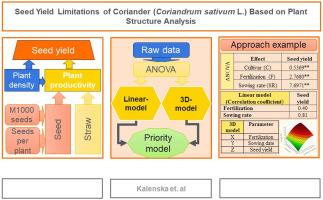Seed yield limitations of coriander (Coriandrum sativum L.) based on plant structure analysis
Abstract
The present study describes the dependencies of key productivity and growth indicators of coriander plants on sowing rate and fertilization parameters. The aim of the research was to establish the patterns of coriander yield formation through the prism of plant structure considering modifications in nutrient conditions and sowing rates. Graphical models and correlation matrices were developed for three coriander varieties with similar morphological features (Oksanit, Nectar, Caribe). Data from field studies conducted in 2013–2015 in the Forest-Steppe zone of Ukraine serve as the basis for model construction. Two variable technological elements were studied (sowing rate of seeds; fertilization system) to determine the dependencies of biometric indicators for each variety. 3D graphical models of dependency for structural elements showed advantages over linear models. Seed yield of coriander in the study ranged from 1.24 t/ha with the lowest sowing rate to 1.91 t/ha with a sowing rate of 2.5 million seeds/ha. Maximum essential oil yield for cv. Oksanit was 46.4 kg/ha with a seed yield of 2.16 tons/ha. Cv. Nectar forms 45.6 kg/ha of essential oil with a seed yield of 2.01 tons/ha, and cv. Caribe forms 40.6 kg/ha with a seed yield of 2.06 tons/ha. Absence of statistically significant correlation between seed yield and essential oil output points to the peculiarities of the experiment. Research factors have opposing effects on the formation of essential oil, and consequently, its yield from the seed yield. The value of the results lies in the potential application of this approach in practice and the implementation of findings in the humid zone. The development of productivity models (like 3D plots) across a range of multiple factors simultaneously, based on crop structure indicators, allows for the prediction of target crop parameters, enabling the efficient utilization of available resources.


 求助内容:
求助内容: 应助结果提醒方式:
应助结果提醒方式:


